Bringing a dog into your family is a joyous occasion, but for many, the thought of constant shedding and pervasive dog hair can be a significant deterrent. If you’re a family looking for a loving canine companion that won’t leave a trail of fur across your home, you’re in luck! There’s a wonderful array of small dog breeds renowned for their minimal to non-shedding coats, making them ideal choices for households seeking a cleaner environment or dealing with allergies. These breeds often have hair rather than fur, which tends to grow continuously and shed much less, although they do require regular grooming.
Choosing the Best Non Shedding Small Dogs For Families involves more than just their coat type. It’s crucial to consider temperament, energy levels, trainability, and how well they adapt to children and a bustling family environment. This comprehensive guide will walk you through some of the most charming and compatible small, non-shedding dog breeds, highlighting what makes each one a fantastic addition to a family, from their personalities to their specific care needs. Whether you’re a first-time owner or looking to add another furry member, understanding specific breed characteristics will help you find your perfect match.
Key Considerations When Choosing a Small, Non-Shedding Dog for Your Family
Before diving into individual breeds, let’s explore the essential factors families should weigh when selecting a new dog:
- Temperament with Children: A dog’s disposition towards children is paramount. You’ll want a breed known for its patience, playfulness, and tolerance, especially if you have young kids. Some smaller breeds can be more delicate or easily startled, so understanding their typical reactions to energetic children is important.
- Activity Level: Does your family lead an active outdoor lifestyle, or do you prefer quiet evenings at home? Matching the dog’s energy needs with your family’s routine is key to a happy home. Many small breeds are adaptable but still require regular exercise and mental stimulation.
- Grooming Requirements: While non-shedding dogs reduce hair cleanup, they often demand more intensive grooming to prevent matting and keep their coats healthy. This can involve daily brushing, regular professional grooming appointments, and occasional baths. Consider if your family has the time and resources for this commitment.
- Trainability and Socialization: A well-behaved dog is a joy to live with. Look for breeds that are intelligent and eager to please, making them easier to train. Early socialization is crucial for any puppy to grow into a confident and friendly adult dog, especially one that will interact with many people and possibly other pets in a family setting.
- Hypoallergenic Qualities: For families with allergy sufferers, a truly hypoallergenic breed (or as close as it gets) is a game-changer. These dogs typically produce less dander, the primary allergen, along with minimal shedding.
Wonderful Small, Non-Shedding Dog Breeds for Family Life
Here’s an in-depth look at some of the top contenders for families seeking a small, non-shedding canine companion:
Affenpinscher
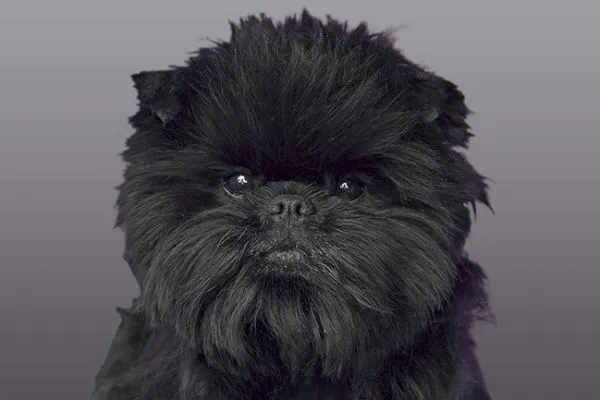 Affenpinscher, a small non-shedding dog, looking alert and intelligent, suitable for families.
Affenpinscher, a small non-shedding dog, looking alert and intelligent, suitable for families.
The Affenpinscher, whose name translates to “monkey-like terrier,” lives up to its moniker with an intelligent and mischievous expression. Despite their small stature, these Toy breed dogs are surprisingly fearless and make excellent watchdogs, alerting the family to any approaching strangers. Their wiry coat is a dream for families concerned about shedding, as it sheds very little and has almost no “doggy” odor, which is a big plus for indoor living. Affenpinschers are known for their sense of humor and affectionate nature towards their families, enjoying both playtime and quiet cuddle sessions. They thrive in homes where they receive consistent training and early socialization, making them well-adjusted companions for respectful children. Weekly brushing with a slicker brush and comb is usually sufficient to keep their shaggy-yet-neat appearance.
Basenji
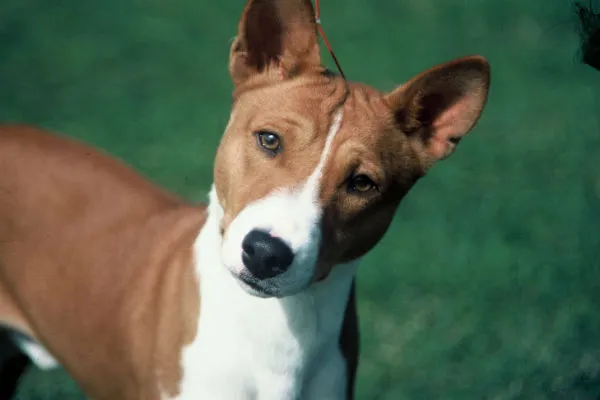 Basenji, a short-haired minimal shedding dog, posing elegantly for families.
Basenji, a short-haired minimal shedding dog, posing elegantly for families.
Often called the “barkless dog,” the Basenji is an excellent choice for families who appreciate a quiet home and minimal shedding. This unique hound breed boasts a short, fine coat that requires very little maintenance beyond occasional brushing, and it sheds only minimally. Basenjis are known for their cat-like grooming habits, keeping themselves remarkably clean and odor-free. While they are famously quiet, they are also highly energetic and intelligent, requiring daily exercise and mental stimulation to prevent boredom. Families with active lifestyles who can provide plenty of outdoor adventures will find the Basenji a loyal and engaging companion. Their independent spirit means training requires patience and consistency, but their playful nature makes them fun partners for older, respectful children who understand how to interact with an active dog.
Bichon Frise
 Bichon Frise puppy with a fluffy white coat, a non-shedding and hypoallergenic small dog for families.
Bichon Frise puppy with a fluffy white coat, a non-shedding and hypoallergenic small dog for families.
The Bichon Frise is the quintessential non-shedding small dog breed, making them a top choice for families with allergy sufferers. Their delightful “powder-puff” appearance comes from a continuously growing double coat of soft, curly hair that traps shed hairs, preventing them from falling out. While low-shedding, these playful and affectionate dogs are not low-maintenance in terms of grooming. Regular, even daily, brushing is essential to prevent matting, and professional grooming every 4-6 weeks is necessary to maintain their iconic look and coat health. Bichons are renowned for their cheerful dispositions, eagerness to please, and adaptability, making them wonderful companions for families with children of all ages. They thrive on attention and are generally good-natured and patient with kids, enjoying games and cuddles alike.
Bolognese
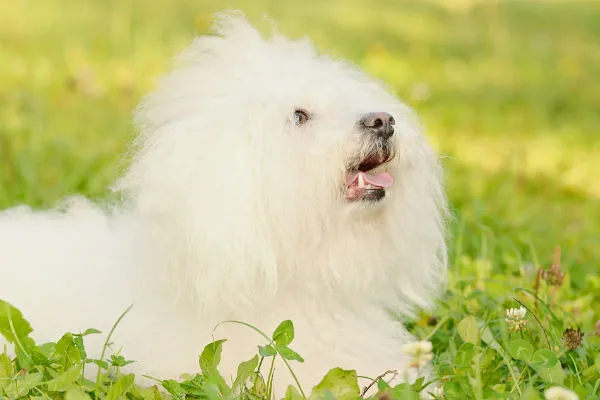 Bolognese dog with its distinctive fluffy white coat, a non-shedding small breed.
Bolognese dog with its distinctive fluffy white coat, a non-shedding small breed.
Similar to the Bichon Frise, the Bolognese possesses a distinctive fluffy white coat composed of hair, not fur, meaning they are a non-shedding breed. This makes them another excellent option for families concerned about allergies or excessive dog hair. However, like other non-shedding breeds, their beautiful coat requires consistent care. Daily brushing is crucial to remove dead hairs and prevent mats and tangles, and regular professional grooming will help maintain their charming appearance. Bolognese dogs are known for their calm, devoted, and intelligent nature. They form strong bonds with their families and are typically gentle and patient with children, making them loving lap dogs and adaptable companions. Their moderate energy levels are easily met with indoor play and short daily walks, fitting well into various family lifestyles.
Brussels Griffon
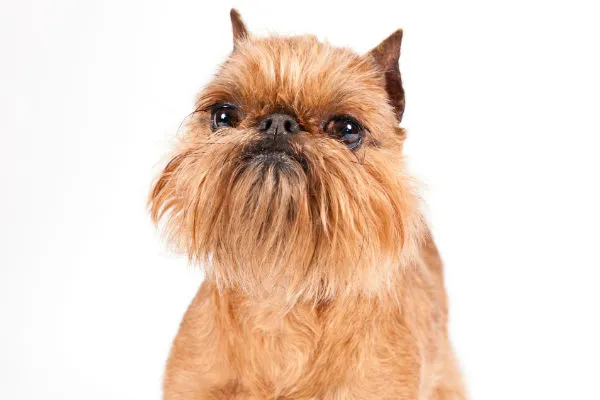 Brussels Griffon with a rough coat and expressive eyes, a minimal shedding small dog.
Brussels Griffon with a rough coat and expressive eyes, a minimal shedding small dog.
Don’t let the Brussels Griffon’s small size fool you; this breed is full of personality and robust enough for family life. They come in both smooth-coated and rough-coated varieties, both of which are minimal shedders. The rough-coated Griffons shed even less and require regular hand-stripping or clipping to maintain their coat, while smooth-coated ones need less intense grooming. These loyal little dogs thrive on being close to their families and do best in homes where they are not left alone for extended periods. They are intelligent, sensitive, and can be quite playful, enjoying games with older, gentle children. Their exercise needs are moderate, usually satisfied with a daily walk and indoor play, making them suitable for apartment living or homes with smaller yards. Early socialization helps them become confident family members.
Chinese Crested
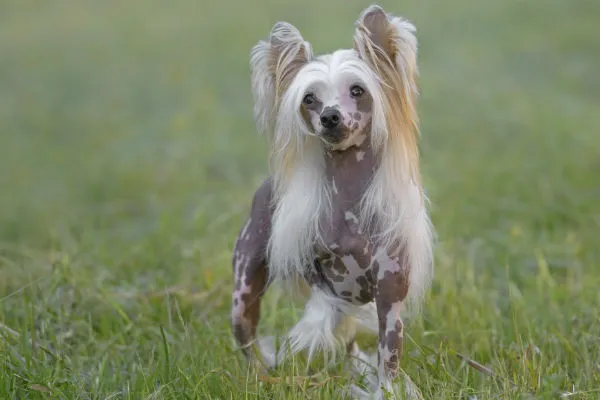 Hairless Chinese Crested dog showing its unique features, a very low shedding breed.
Hairless Chinese Crested dog showing its unique features, a very low shedding breed.
For families prioritizing extremely low shedding, the Chinese Crested offers a unique solution. This breed comes in two varieties: the Hairless and the Powderpuff. The Hairless variety truly minimizes shedding, having hair only on its head, tail, and feet. The Powderpuff has a soft, full coat of fine hair that sheds very minimally. Hairless dogs require special skin care, including protection from sun and cold, and are prone to skin irritations, so families must be prepared for this commitment. Powderpuffs need regular brushing to prevent tangles. Chinese Crested dogs are affectionate, playful, and often form strong bonds with their primary caregivers. They are generally good with children, especially if raised with them, and their moderate energy makes them adaptable to various living situations.
Coton De Tulear
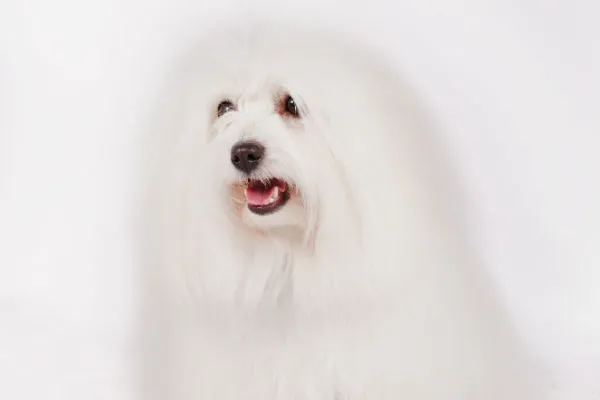 Coton de Tulear with its long, fluffy white coat, a hypoallergenic and non-shedding small dog.
Coton de Tulear with its long, fluffy white coat, a hypoallergenic and non-shedding small dog.
The Coton de Tulear, known as the “Royal Dog of Madagascar,” possesses a distinctive, long, fluffy coat that is considered hypoallergenic and sheds minimally, making it an excellent choice for allergy sufferers and families seeking a clean home. Their lighthearted and gentle nature makes them wonderful companions, but their beautiful coat does require daily grooming to prevent matting. Regular brushing and occasional professional grooming are essential to keep them looking their best. Cotons are highly adaptable, cheerful, and thrive on human companionship, forming deep bonds with their families. They are typically very good with children, patient and playful, enjoying games as much as cuddling on a lap. Their moderate exercise needs can be met with daily walks and indoor play, making them suitable for various home environments.
Havanese
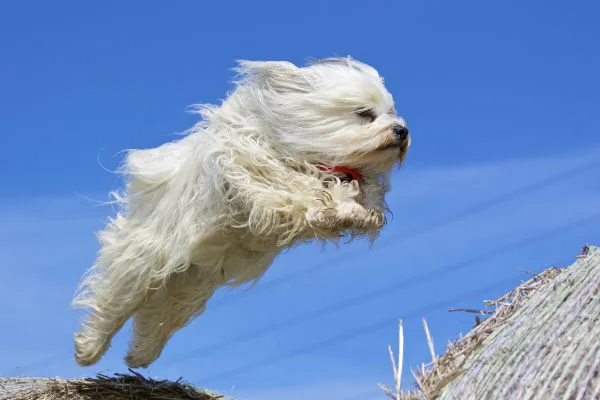 Havanese dog with its long, silky coat, a non-shedding and charming family dog.
Havanese dog with its long, silky coat, a non-shedding and charming family dog.
The Havanese, the national dog of Cuba, brings patented spunky charm and a coat that doesn’t shed, offering families less time spent lint rolling and more time playing. Their long, silky hair requires weekly brushing and regular baths to keep it clean, healthy, and tangle-free, with many owners opting for a “puppy cut” for easier maintenance. Havanese dogs are known for their outgoing, playful, and intelligent personalities. They are natural entertainers and thrive on being the center of family attention, making them exceptionally devoted companions. Generally good with children and other pets, they are adaptable and fit well into homes of all sizes, provided they receive enough mental stimulation and moderate daily exercise. Their sturdy build for a small dog allows them to handle playful interactions well.
Maltese
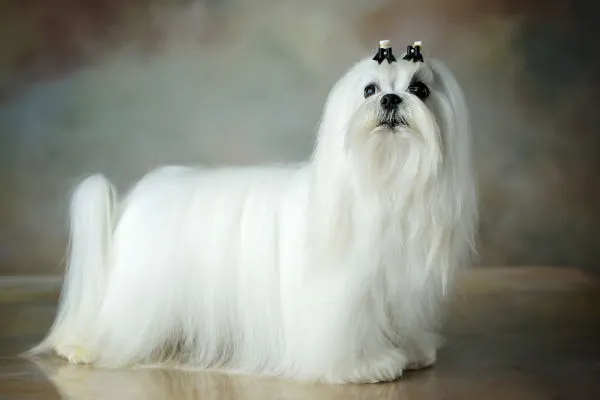 Maltese dog with its long, flowing white coat, a low-shedding and ancient breed.
Maltese dog with its long, flowing white coat, a low-shedding and ancient breed.
For over three millennia, Maltese dogs have charmed their human counterparts, and their popularity in families continues due to their elegant appearance and low-shedding coats. Their long, pure white, silky hair sheds very little, making them ideal lap dogs and suitable for many allergy sufferers. However, their exquisite coats demand regular attention; daily brushing is necessary to prevent mats, and occasional baths remove dirt and keep their hair pristine. Maltese dogs are affectionate, gentle, and lively, forming strong bonds with their families. They enjoy playtime and are generally good with older, respectful children who understand how to handle a delicate small dog. Their small size makes them perfect for apartment living, requiring only moderate exercise such as short daily walks and indoor games.
Lhasa Apso
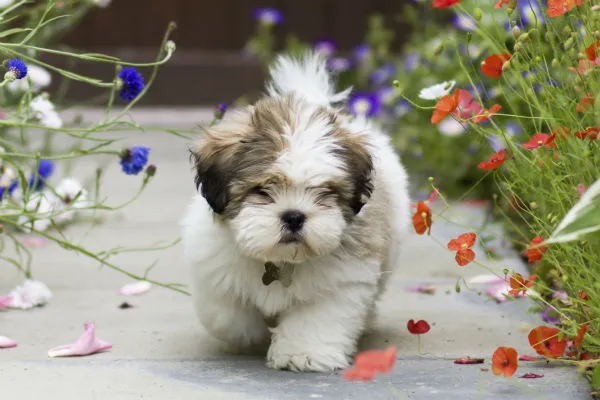 Lhasa Apso puppy with long flowing hair, a non-shedding Tibetan companion.
Lhasa Apso puppy with long flowing hair, a non-shedding Tibetan companion.
Originating from Tibet, the Lhasa Apso is a small dog breed that makes an excellent, long-lived family companion. Calm yet playful, Lhasas enjoy brisk walks and restful moments on their owner’s lap. They are a non-shedding breed, but their long, dense double coat does require significant maintenance to prevent matting. Many families opt for a “puppy cut” to manage their coat more easily, reducing the need for daily extensive brushing. Lhasa Apsos are known for their confident, assertive, and independent personalities. They are naturally wary of strangers but fiercely loyal and affectionate with their own families, including well-behaved children. Early socialization and consistent training are key to nurturing their best qualities.
Miniature Schnauzer
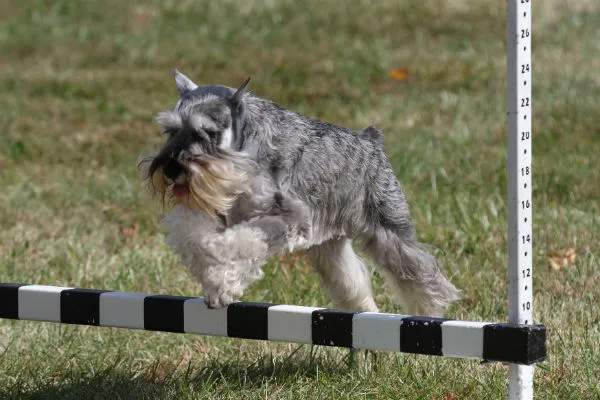 Miniature Schnauzer with its characteristic beard and eyebrows, a minimal shedding terrier.
Miniature Schnauzer with its characteristic beard and eyebrows, a minimal shedding terrier.
The Miniature Schnauzer is a smart, trainable, and cheerful little dog that strongly resembles its Standard Schnauzer cousin. This robust Terrier breed sheds very little, making it a great option for families seeking a low-allergen pet. Their wiry double coat requires weekly brushing and regular professional grooming (clipping or hand-stripping) to maintain its distinctive appearance and health. Miniature Schnauzers are known for their playful, alert, and devoted nature. They are highly intelligent and eager to please, which makes them relatively easy to train and excellent family companions. They adapt well to city or country living, as long as they are close to their people and receive regular exercise and mental stimulation. Their sturdy build and spirited personalities make them well-suited for families with active children.
Poodle (Toy & Miniature)
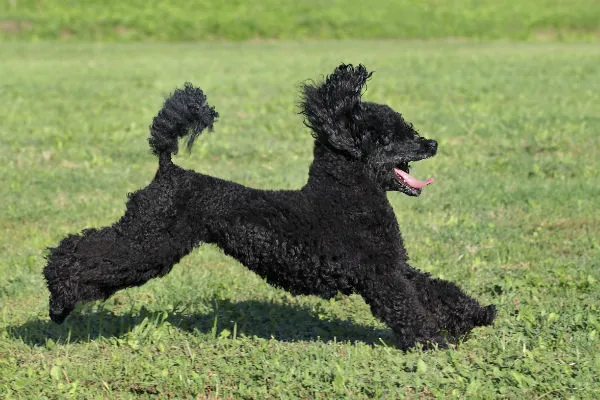 Miniature Poodle with a classic haircut, a highly intelligent and non-shedding dog.
Miniature Poodle with a classic haircut, a highly intelligent and non-shedding dog.
When thinking of non-shedding dogs, the Poodle often comes to mind, and for good reason. Miniature and Toy Poodles offer these coveted qualities in petite, intelligent packages. All Poodles are non-shedding and considered hypoallergenic, making them one of the best choices for families with allergies. Their signature curly coat, however, does require regular professional grooming every 4-6 weeks and daily brushing at home to prevent matting. Poodles are renowned for their exceptional intelligence, making them highly trainable and eager to learn tricks and commands. They are active, proud, and playful dogs that thrive on mental and physical engagement. Their friendly and adaptable nature, combined with their patience and good humor, makes them wonderful family pets that get along well with children of all ages.
Scottish Terrier
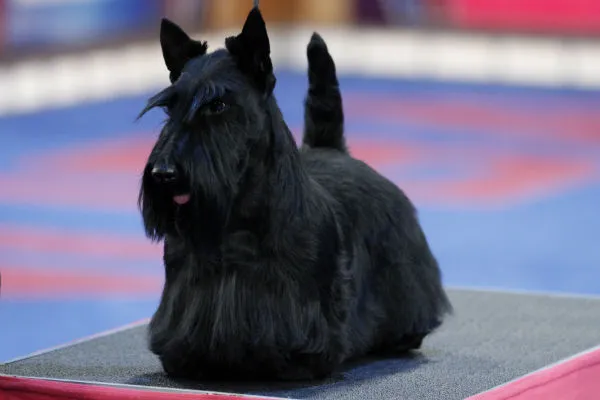 Scottish Terrier with its distinctive profile and wiry coat, a minimal shedding breed.
Scottish Terrier with its distinctive profile and wiry coat, a minimal shedding breed.
The Scottish Terrier, or “Scottie,” is a Terrier breed known for its boldness, confidence, and big personality in a compact size. Their wiry, weather-resistant double coat sheds very little, which is a great advantage for families. However, it does require regular brushing, grooming, and occasional hand-stripping to maintain its health and distinctive outline. Scotties are clever and independent dogs with strong prey drives, so supervision around smaller pets is advisable. They are fiercely loyal and affectionate with their families, often forming a close bond with one or two people. With proper socialization and consistent training, they can be good companions for older, respectful children who appreciate their spirited nature. Daily walks and playtime are usually sufficient to meet their exercise needs.
Shih Tzu
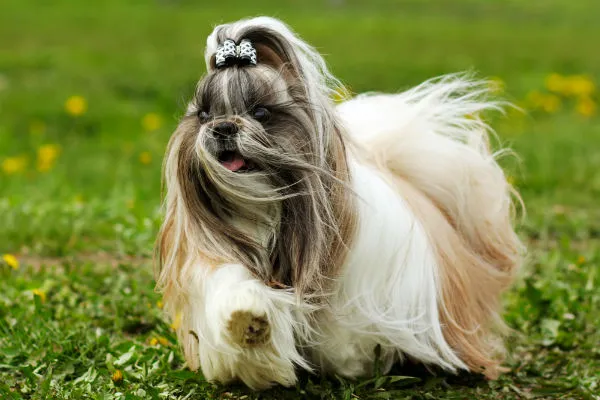 Shih Tzu with long, flowing hair looking regal, a low-shedding and affectionate family pet.
Shih Tzu with long, flowing hair looking regal, a low-shedding and affectionate family pet.
The Shih Tzu, an ancient breed favored by Chinese royalty, is another fantastic non-shedding option for families. These “little lion dogs” come in a variety of colors and patterns, and their long, silky hair is very low-shedding. This regal coat looks exceptionally beautiful when brushed out daily, which is crucial to prevent mats and tangles. Many families choose a shorter “puppy cut” for easier maintenance. Shih Tzus are sturdy, lively Toy breed dogs known for their gentle, trusting, and outgoing nature. They were bred to be house pets and companions, excelling at this role with their affectionate disposition. They are generally wonderful with children, thriving on attention and loving to cuddle. Their moderate exercise needs are easily met with indoor play and short walks, making them suitable for most living environments.
West Highland White Terrier
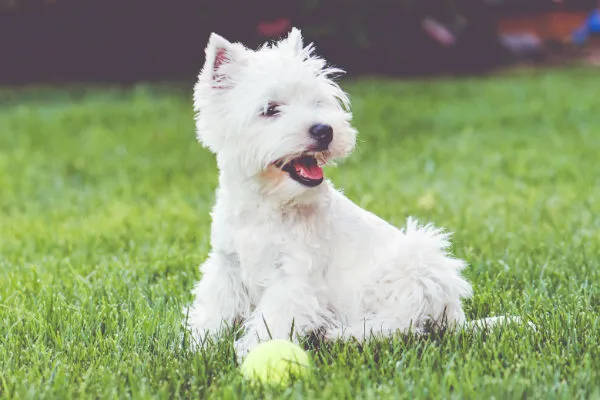 West Highland White Terrier (Westie) standing alert, a sturdy and minimal shedding dog.
West Highland White Terrier (Westie) standing alert, a sturdy and minimal shedding dog.
Affectionately known as “Westies,” West Highland White Terriers are beloved for their coarse, white hair that sheds very little, making them a popular choice for families. This sturdy little dog is intelligent, loyal, happy, and highly entertaining. Their wiry coat requires regular brushing and professional grooming (hand-stripping or clipping) to keep it healthy and free of debris. Westies are curious dogs with moderate energy levels and an independent streak common among all Terriers, which can make training a fun challenge. They are generally good with children, especially when raised with them and properly socialized. Their playful spirit and compact size make them adaptable to various family settings, providing they get their daily dose of exercise and mental engagement.
Xoloitzcuintli (Mexican Hairless)
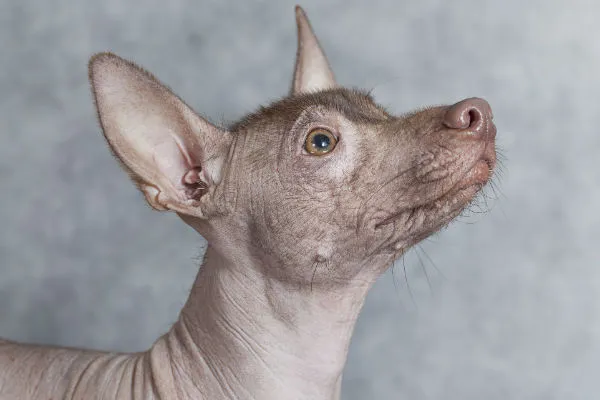 Xoloitzcuintli (Mexican Hairless) dog, showing its unique hairless skin and alert expression.
Xoloitzcuintli (Mexican Hairless) dog, showing its unique hairless skin and alert expression.
The Xoloitzcuintli, also known as the Mexican Hairless, is an ancient and rare breed that comes in both hairless and coated varieties. The hairless Xolo is an exceptional choice for families seeking an almost completely non-shedding dog, as they retain only a small amount of hair on their heads. The coated variety has a very short, fine coat that sheds minimally. As with any hairless breed, the Xolo requires extra attention to their skin to protect them from sun, cold, and irritations. Xolos are known for their tranquil personality around the home, making them affectionate companions and attentive watchdogs. While they enjoy physical activities like vigorous play and walks, they are generally calm indoors. They bond deeply with their families and can be good with children when properly socialized, offering a unique and loving presence.
Yorkshire Terrier
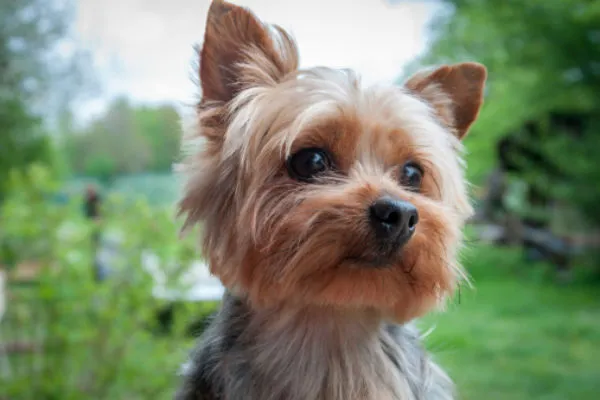 Yorkshire Terrier (Yorkie) with its beautiful silky coat, a small non-shedding toy breed.
Yorkshire Terrier (Yorkie) with its beautiful silky coat, a small non-shedding toy breed.
Sprightly, tomboyish, and affectionate, the Yorkshire Terrier, often called the “Yorkie,” is a Toy breed full of personality and a popular choice among families. Yorkies do not shed, and their long, silky coats are beautiful when brushed out daily, which is made easy by their small size. Many owners choose to keep their Yorkies in a “puppy cut” to simplify grooming. Don’t be fooled by their regal carriage – Yorkies have working-class roots, originally hunting rats in English clothing mills. Today, these fearless terriers are just as happy to sit on their owner’s lap as they are exploring. They are highly intelligent, confident, and form strong bonds with their families. With proper socialization, Yorkies can be wonderful companions for families, often getting along well with older, respectful children who can appreciate their spirited yet loving nature.
Choosing the Right Fit for Your Family
The journey to find the best non shedding small dogs for families is an exciting one, opening up a world of adorable and compatible canine companions. Just because a dog doesn’t shed doesn’t mean it’s maintenance-free; in fact, many require dedicated grooming to keep their unique coats healthy and tangle-free. It’s essential to look beyond the shedding factor and carefully research each breed’s temperament, exercise requirements, and overall needs to ensure a perfect match with your family’s lifestyle and personality.
Consider your family’s activity level, the ages of your children, and the amount of time you can dedicate to grooming and training. The right non-shedding small dog will bring immense joy, companionship, and a significantly cleaner home environment to your family for years to come. Always ensure you purchase a dog from a reputable breeder or consider adoption from a trusted rescue. Provide your new family member with a high-quality diet, consistent training, plenty of love, and regular veterinary check-ups to ensure a long, healthy, and happy life together.
